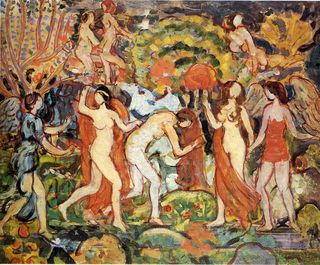Fantasies
What Sexual Fantasies Can Do for a Relationship
Fantasies may affect the relational atmosphere as much as they reflect it.
Posted August 18, 2018

Sexual desire is among the strongest forces in human nature, one that can induce ecstatic pleasure and a profound connection between partners. Unfortunately, desire tends to diminish gradually over time when the novelty and mystery that fuel it fade away. A decrease in the frequency of sexual fantasies about existing partners ("dyadic fantasies") and an increase in the frequency of fantasies about other people ("extra-dyadic fantasies") are typical manifestations of this process, as partners seek other sources of novelty and variety, at least in the fantasy realm. These fantasies may satisfy the need for novelty and variety without threatening the relationship. Still, some of them may make relationship deficiencies more salient, leading to further relationship dissatisfaction.
Research addressing the functions of sexual fantasies has mainly focused on variables associated with the frequency and content of sexual fantasy. For example, it was found that people tend to represent themselves in their fantasies as more helpless following negative couple interactions1. Relatively less is known about how sexual fantasizing affects the relationship. Scholars did acknowledge that the use of fantasies might act as an aphrodisiac that increases sexual desire. However, the relevant literature has been largely based on clinical impressions, rather than systematic research, and has offered conflicting views about whether and why "fantasies training" (i.e., guiding partners to generate arousing sexual imagery) promotes relationship well-being2. Research3 published recently in the Personality and Social Psychology Bulletin investigated whether and why sexual fantasies affect the relational atmosphere.

In four studies, my colleagues and I examined the relational consequences of dyadic and extra-dyadic sexual fantasies. In Study 1, romantically involved participants were instructed to fantasize sexually about either their partner (a dyadic fantasy condition) or someone else (an extra-dyadic fantasy condition) and then to describe this fantasy in narrative form. Following this procedure, participants indicated their desire to have sex with their partner, as well as their desire to do something that would make their partner happy. Participants in the dyadic fantasy condition expressed a greater desire to engage in sex with their partners and to do something that would make them happy compared to participants in the extra-dyadic fantasy condition.
Study 2 sought to clarify whether the difference in the expressed desires between dyadic and extra-dyadic fantasy conditions reflects the positive influence of dyadic fantasizing or the negative influence of extra-dyadic fantasizing. To do so, we added two non-sexual conditions in which participants imagined that they discussed a recent concern, either with their partner or with someone else. The inclusion of these control conditions also allowed us to rule out the possibility that merely thinking about one's partner increases the desire for engaging in sex and other relationship-promoting behaviors regardless of context (i.e., sexual versus nonsexual).
Specifically, romantically involved participants imagined one of four scenarios that involved engaging in sexual or non-sexual activity with either their partner or someone who was not their romantic partner. Then, they described this scenario in narrative form and rated their desire to have sex and to engage in positive, nonsexual activities with their partner (e.g., an intimate, nonsexual conversation). The results showed that extra-dyadic fantasizing did not decrease the desire to engage in sex with one's partner and other relationship-promoting behaviors. Rather, dyadic fantasizing increased these desires. The findings also demonstrated that the beneficial effects of dyadic fantasizing were unique to the sexual realm.
Study 3 explored whether these effects would apply in settings that are more natural. To do so, both members of the participating romantic couples completed a daily diary for three weeks in which they independently described their sexual fantasies immediately after every occasion in which they experienced them. In addition, they reported on the positive and negative behaviors that characterized their relationship on that day (e.g., “I told my partner I loved him/her"; "I criticized my partner") every evening for 21 days. The findings revealed that participants were more likely to engage in relationship-promoting behaviors, such as complimenting their partners and acting considerately towards them, after fantasizing about them. Sexually fantasizing about someone else, by comparison, was not associated with engaging in either relationship-promoting or relationship-damaging behaviors.
Study 4 was designed to investigate why people who fantasize about their partner are more likely to engage in relationship-promoting behaviors. For this purpose, both members of romantic couples completed a nightly diary for six weeks in which they recorded their frequency of dyadic fantasies, desire to engage in sex with their partner, positive and negative relational perceptions (e.g., "I felt that I have a very valuable relationship today"; "I had doubts about the compatibility between me and my partner today"), and relationship-promoting behaviors. Fantasizing about one's partner appeared to enhance not only the partner's appeal, but also that of the relationship, diminishing negative views and making the relationship seem more valuable. This enhanced appeal, in turn, seems to motivate partners to further invest in the relationship.
Overall, these findings demonstrate how fantasies may influence us in the real world. In particular, merely thinking about sex with one's partner could have beneficial relationship effects, leading to greater sexual desire for current partners, as well as more positive behavior toward them. Dyadic fantasizing may thus serve as a relationship-maintenance mechanism that helps partners sustain satisfying intimate relationships over the long run by boosting partner and relationship appeal and inhibiting engagement in relationship-damaging behaviors.
This post also appeared here.
References
1. Birnbaum, G. E., Mikulincer, M., & Gillath, O. (2011). In and out of a daydream: Attachment orientations, daily relationship quality, and sexual fantasies. Personality and Social Psychology Bulletin, 37, 1398-1410.
2. Newbury, R., Hayter, M., Wylie, K. R., & Riddell, J. (2012). Sexual fantasy as a clinical intervention. Sexual and Relationship Therapy, 27, 358-371.
3. Birnbaum, G. E., Kanat-Maymon, Y., Mizrahi, M., Recanati, M., & Orr, R. (in press). What fantasies can do to your relationship: The effects of sexual fantasies on couple interactions. Personality and Social Psychology Bulletin. ResearchGate


